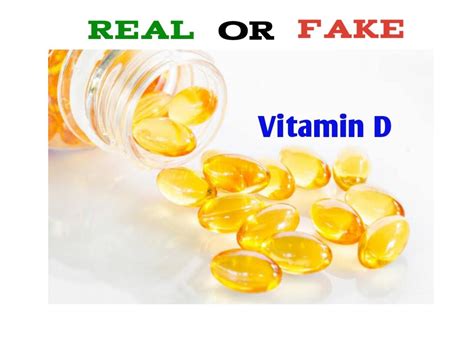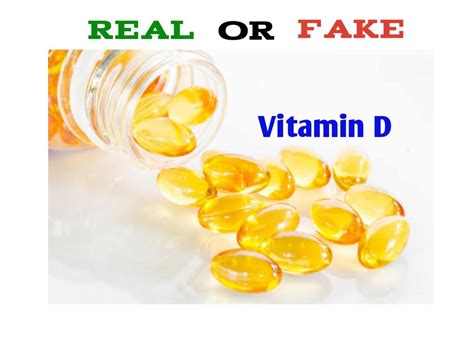How to Identify Fake Vitamins and Supplements: A Comprehensive Guide
In an age obsessed with health and wellness, vitamins and supplements have become increasingly popular. But with the rise in demand comes a growing concern: counterfeit products. Sadly, the market is flooded with fake vitamins and supplements, posing a serious threat to consumer health and safety.
Navigating the world of supplements can be daunting, especially when trying to distinguish between genuine and counterfeit products. This comprehensive guide will provide you with the knowledge and tools you need to identify fake vitamins and supplements, ensuring you make informed choices for your health and well-being.
How Can I Tell If My Vitamins Are Fake?
Identifying fake vitamins and supplements can be challenging, as counterfeiters become increasingly sophisticated in their methods. However, there are several telltale signs to watch out for:
1. Check the Packaging:
- Misspellings and grammatical errors: Fake products often have poor packaging quality, with misspellings, grammatical errors, and inconsistencies in branding.
- Fuzzy or blurry images: Pay attention to the images on the packaging. If they appear fuzzy, blurry, or pixelated, it could be a sign of a counterfeit product.
- Missing or incomplete information: Legitimate supplements should have a clear label with information such as the product name, ingredients, dosage, manufacturer details, and expiry date. Missing or incomplete information is a red flag.
- Unusual color or texture: The color and texture of the pills or capsules should be consistent with the genuine product. Any unusual variations could indicate a counterfeit.
2. Look for Certification and Seals:
- Third-party certifications: Look for certifications from reputable organizations like NSF International, USP, and Informed-Sport. These organizations test and verify the quality and authenticity of supplements.
- Government-approved seals: In some countries, the government may have specific seals or markings for approved supplements. Check for these seals to ensure authenticity.
3. Consider the Price:
- Unbelievably low prices: If a supplement is significantly cheaper than other similar products, it may be a counterfeit. Be cautious of deals that seem too good to be true.
- Price fluctuations: If the price of a supplement fluctuates wildly or is inconsistent across different retailers, it could be a sign of a fake product.
4. Research the Brand and Manufacturer:
- Check online reviews: Read online reviews and customer feedback to get an idea of the brand’s reputation and product quality.
- Verify the manufacturer’s website: Visit the manufacturer’s official website and look for information about their products, certifications, and contact details.
5. Trust Your Instincts:
- If something feels off, it probably is: If you have any doubts or suspicions about a product, it’s best to err on the side of caution and avoid purchasing it.
It is important to note that these are just a few common indicators, and not every fake product will exhibit all of these signs. However, by being vigilant and paying attention to these details, you can significantly reduce the chances of purchasing a counterfeit supplement.
What Are the Dangers of Taking Fake Vitamins and Supplements?
Taking fake vitamins and supplements can pose several risks to your health. These risks can range from mild side effects to serious health complications.
1. Lack of Effectiveness:
Fake supplements may not contain the advertised ingredients or may contain lower concentrations than stated. This means you may not be getting the intended benefits, leaving you disappointed and potentially harming your health.

2. Potential for Harmful Ingredients:
Counterfeit supplements may contain undeclared or unlisted ingredients, such as heavy metals, pesticides, or other contaminants. These ingredients can cause various health problems, ranging from allergic reactions to serious organ damage.
3. Interaction with Medications:
Some fake supplements may contain substances that interact with prescribed medications, leading to adverse effects. It’s crucial to inform your doctor about any supplements you are taking, especially if you are on medication.
4. Financial Loss:
You are wasting your money on products that do not deliver the promised benefits or may even be harmful. Remember, you deserve quality products that are safe and effective.
It’s essential to remember that the health risks associated with fake supplements are not limited to the individual. The spread of counterfeit products can lead to a decline in consumer confidence in the supplement industry, making it more challenging for legitimate manufacturers to operate.
How Can I Avoid Buying Fake Vitamins and Supplements?
Taking proactive steps can significantly reduce the risk of purchasing counterfeit supplements. Here are some tips to help you make informed choices:
1. Purchase from Reputable Retailers:
Choose established and reputable retailers known for selling genuine products. Look for stores with a good track record and positive customer reviews.

2. Research the Brand:
Before making a purchase, research the brand and manufacturer. Check for online reviews, visit their website, and see if they have any certifications or awards that validate their legitimacy.
3. Look for Third-Party Certifications:
Check for certifications from reputable organizations like NSF International, USP, and Informed-Sport. These certifications ensure that the supplements have been tested for quality, purity, and authenticity.
4. Be Wary of Unbelievably Low Prices:
If a supplement is significantly cheaper than other similar products, it may be a counterfeit. Be cautious of deals that seem too good to be true.
5. Contact the Manufacturer:
If you have any doubts about a product, contact the manufacturer directly. They should be able to provide you with information about their manufacturing processes, quality control measures, and certifications.
6. Report Suspicious Products:
If you come across a product that you suspect is fake, report it to the relevant authorities or consumer protection agencies. By reporting suspicious products, you can help protect other consumers from potential harm.
What are the Different Types of Fake Vitamins and Supplements?
Fake vitamins and supplements can mimic almost any legitimate product available on the market. Some of the most common types of counterfeit supplements include:
1. Multivitamins:
Counterfeit multivitamins are often found as pills, capsules, or gummies, and may contain lower dosages of the advertised ingredients or even harmful substances.
2. Protein Powders:
Fake protein powders may contain lower protein content, fillers, or even dangerous chemicals. Be careful when buying protein powders from unknown or unverified sources.
3. Omega-3 Fatty Acid Supplements:
Counterfeit omega-3 supplements may contain lower amounts of the desired omega-3 fatty acids, fillers, or even expired or rancid oils.
4. Weight Loss Supplements:
Fake weight loss supplements may contain banned or dangerous ingredients, such as stimulants or diuretics. These ingredients can have serious side effects and may even be life-threatening.
5. Herbal Supplements:
Counterfeit herbal supplements may contain lower concentrations of the active ingredients or even adulterated with other herbs or substances.
How Can I Report Fake Vitamins and Supplements?
If you suspect you have purchased a fake vitamin or supplement, or if you come across a product that you believe is counterfeit, it’s important to report it to the appropriate authorities. This will help protect other consumers and prevent the spread of fake products.
1. Contact the Retailer:
First, contact the retailer where you purchased the product. Inform them about your concerns and provide details about the product, including the brand name, product name, and any suspicious features you observed.
2. Report to Consumer Protection Agencies:
Report the counterfeit product to your local consumer protection agency or the Food and Drug Administration (FDA) in the United States. These agencies have the authority to investigate and take action against counterfeiters.
3. Inform the Brand Manufacturer:
Contact the manufacturer of the genuine product and report the suspected counterfeit. They may be able to provide you with further guidance or assistance.
4. Share Your Experience Online:
Share your experience online on forums, social media, or review websites. This will help raise awareness about the issue and potentially warn other consumers.
By reporting counterfeit products, you are playing a vital role in protecting yourself and others from potentially harmful products and ensuring a safer supplement industry for everyone.
What Should I Do if I Have Already Taken Fake Vitamins and Supplements?
If you have already taken fake vitamins and supplements and are concerned about your health, it’s crucial to seek medical advice. Here’s what you should do:
1. Consult a Doctor:
Schedule an appointment with your doctor to discuss your concerns. They will be able to assess your situation and recommend any necessary medical tests or interventions.
2. Provide Detailed Information:
Provide your doctor with as much information as possible about the supplements you have taken, including the brand name, product name, ingredients, dosage, and frequency of use.
3. Be Honest:
Be truthful with your doctor about your supplement intake. They need to have a complete understanding of your situation to provide appropriate care.
4. Follow Their Instructions:
Follow your doctor’s instructions carefully and do not stop taking any prescribed medications without their guidance.
Conclusion
Choosing the right vitamins and supplements is an important step in maintaining your health and well-being. But with the prevalence of fake products, it’s more important than ever to be vigilant and informed. By following the tips outlined in this guide, you can significantly reduce the risk of purchasing a counterfeit supplement and ensure you are getting the genuine, high-quality products you need to support your health.
Table Summarizing the Information
Here is a table summarizing the information in this article:
| Topic | Key Points |
|---|---|
| Identifying Fake Supplements |
|
| Dangers of Fake Supplements |
|
| Avoiding Fake Supplements |
|
| Types of Fake Supplements |
|
| Reporting Fake Supplements |
|
| Action After Taking Fake Supplements |
|
Frequently Asked Questions (FAQ)
Here are some frequently asked questions about fake vitamins and supplements:
What are the most common signs of a fake vitamin or supplement?
The most common signs of a fake vitamin or supplement include misspellings or grammatical errors on the packaging, blurry or pixelated images, missing or incomplete information on the label, unusual color or texture of the pills or capsules, and unbelievably low prices.
How can I verify if a brand is legitimate?
To verify the legitimacy of a brand, check for third-party certifications from reputable organizations like NSF International, USP, and Informed-Sport. Visit the brand’s official website and look for information about their manufacturing processes, quality control measures, and certifications.
Where should I buy vitamins and supplements to minimize the risk of buying a fake product?
To minimize the risk of buying a fake product, purchase vitamins and supplements from established and reputable retailers known for selling genuine products. Look for stores with a good track record and positive customer reviews.
What should I do if I suspect I’ve taken a fake supplement?
If you suspect you’ve taken a fake supplement, consult a doctor immediately. Provide them with detailed information about the supplement, including the brand name, product name, ingredients, dosage, and frequency of use. Be honest and follow their instructions carefully.
What are the long-term health consequences of taking fake supplements?
The long-term health consequences of taking fake supplements can vary depending on the specific ingredients and contaminants present. Some potential risks include nutrient deficiencies, organ damage, allergic reactions, and interactions with medications.
Can I test my vitamins and supplements to check if they’re genuine?
While there are some lab tests available to check the authenticity and purity of vitamins and supplements, these tests can be expensive and may not be readily accessible to everyone.
What steps are being taken to combat counterfeit supplements?
Several steps are being taken to combat counterfeit supplements, including increased enforcement by regulatory agencies, collaboration between manufacturers and retailers, and public awareness campaigns to educate consumers about the risks of fake products.
